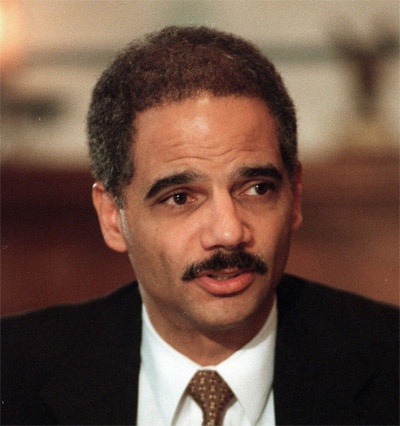DOJ steps up voting rights scrutiny amidst activist groundswell

The war over voting, already roiling in state legislatures and Washington, is about to escalate.
This week, the Obama administration is stepping up opposition to new voting laws passed in 2011 by Republican lawmakers: Attorney General Eric Holder will deliver a speech in Texas today that will spell out the administration's concerns about restrictive voter ID laws passed in several states, as well as legal battles over the Texas redistricting plans .
The venue for Holder's speech is no accident: Lyndon Baines Johnson Presidential Library and Museum in Austin, which heralds the life of the Texas Democrat who signed the Voting Rights Act.
The timing isn't an accident either: The DOJ has taken a growing interest in new voting laws -- not just photo ID requirements, but also the shorterning of the early voting period and new restrictions on ex-felon voting -- just as civil rights and good government goups have stepped up their opposition to the new laws, which they claim are aimed at disenfranchising African-American, Latino and other Democratic voters.
This month, the NAACP stepped up a national campaign against the the laws, calling them a high-tech assault on voting rights rooted in a legacy of discrimination. As North Carolina NAACP leader Rev. William Barber argued:
Jim Crow prevented African Americans from participating at all. James Crow, Esquire, says we can't stop participation per se -- that's illegal now. But we can work to nullify the minority vote ... Jim Crow used blunt tools. James Crow, Esquire, uses surgical tools and high-paid consultants and layers to cut out the heart of black political power.
The NAACP's actions last week targeted the offices of right-wing billionaires Charles and David Koch, echoing another campaign launched by the online activist group Color of Change.
Color of Change is taking on the American Legislative Exchange Council, or ALEC -- a national conservative policy group, which receives funding from the Kochs, that helped helped push photo ID requirements in state legislatures in 2011.
ALEC draws a lot of of its funding from corporate contributors which, in turn, rely on black consumers who Color of Change says will suffer from ALEC's legislation:
ALEC’s voter ID laws are undemocratic, unjust and part of a longstanding right wing agenda to weaken the Black vote. Major companies that rely on business from Black folks shouldn’t be involved in suppressing our vote. Please join us in demanding that these companies stop funding ALEC.
In talking to The Washington Post about his Texas speech, Holder argued that the negative consequences of voter restrictions are especially unjustified given how little evidence there is of voter fraud: "You constantly hear about voter fraud . . . but you don’t see huge amounts of vote fraud out there,’’ Holder said.
Indeed, a much-heralded study recently released by the Republican National Lawyers Association intended to bolster the case for voter ID laws may have actually done the opposite. Looking over a 10-year period, the report found "46 states have had vote fraud convictions or prosecutions in the last decade."
But tellingly, the report found no correlation between voter ID laws and preventing fraud: States with harsh ID laws fared about the same as those without them. And the study confirmed that fraud is extremely rare: As lawyer Debbie Hines points out, the supposedly exhaustive study showed that 30 states had three or fewer proven cases of fraud over the last decade.
What's more, most of the kinds of fraud that the RNLA reports -- absentee ballot fraud, vote buying, improperly filling out registration forms -- would in no way be affected by voter ID laws or other voting changes made in state legislatures.
As Spencer Overton, a George Washington University law professor and former member of the Commission on Federal Election Reform put it:
The existing evidence suggests that the type of fraud addressed by photo ID requirements is extraordinarily small and that the number of eligible citizens who would be denied their right to vote as a result... is exceedingly large.
Tags
Chris Kromm
Chris Kromm is executive director of the Institute for Southern Studies and publisher of the Institute's online magazine, Facing South.
